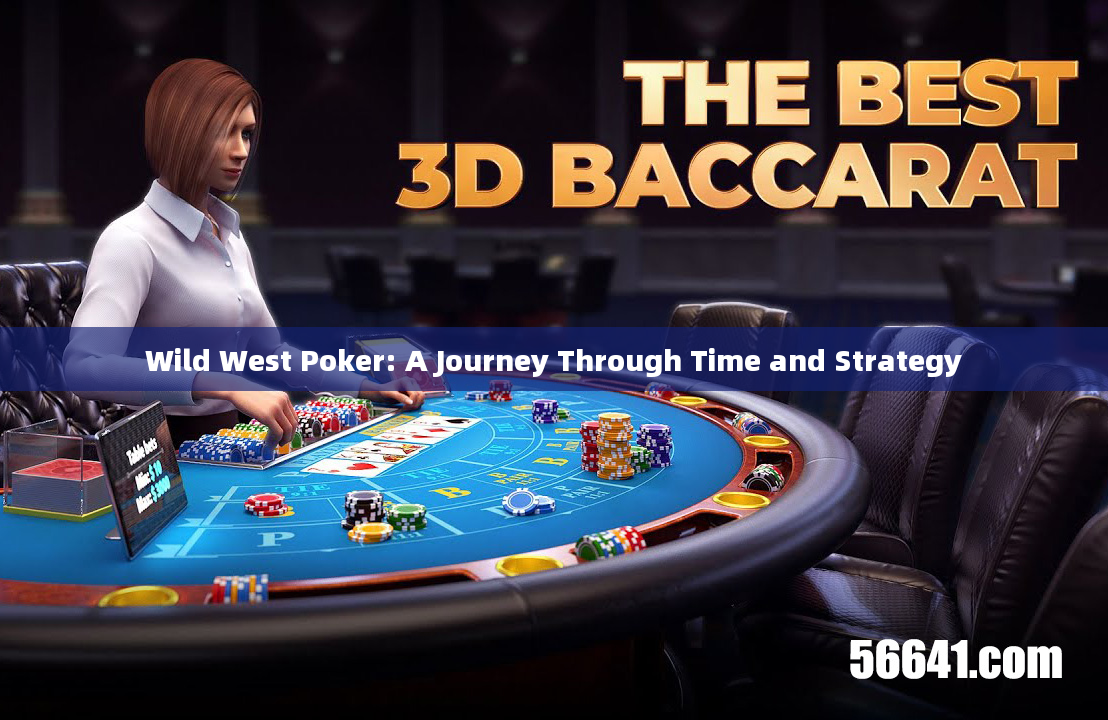About Wild West Poker: A Journey Through Time and Strategy
Abstract
Poker, a game of skill and chance, has a rich history deeply rooted in the American Wild West. This article explores the origins of poker, its evolution during the Wild West era, and its impact on modern gambling culture. We delve into the strategic elements of the game, the legendary players who shaped its history, and the cultural significance of poker in the Wild West. Additionally, we examine the legal and social implications of poker during this period and discuss its future in the digital age.
Introduction to Poker in the Wild West
Origins and Early Development
Poker's origins can be traced back to various card games played in Europe during the 16th and 17th centuries. The game as we know it today evolved from a French game called "Poque" and was brought to North America by French settlers in New Orleans. As the game spread up the Mississippi River, it gained popularity among riverboat gamblers and eventually made its way to the frontier towns of the Wild West.The Role of Poker in Frontier Life
In the Wild West, poker became a central part of frontier life. It was not only a pastime but also a means of social interaction and economic activity. Saloons and gambling halls were common in almost every town, and poker games often attracted a diverse crowd, including miners, cowboys, and outlaws. The game provided a sense of community and a way to pass the time in an otherwise harsh and unpredictable environment.Cultural Significance
Poker in the Wild West is often romanticized in literature and film, portraying it as a game of high stakes and high drama. The image of the lone gambler sitting at a table with a deck of cards and a six-shooter on his hip has become an iconic symbol of the era. This cultural significance has endured, influencing modern perceptions of the game and its players.Strategic Elements of Wild West Poker
Basic Rules and Gameplay
The most common form of poker played in the Wild West was Five-Card Draw. Players would receive five cards and could discard and draw new ones to improve their hand. The objective was to have the best five-card hand according to a predetermined ranking system. Understanding these rules was essential for players to make informed decisions and maximize their chances of winning.Bluffing and Psychological Tactics
One of the most crucial skills in poker is the ability to bluff. Bluffing involves convincing opponents that you have a better hand than you actually do, often through subtle body language and verbal cues. In the Wild West, where stakes were high and trust was low, mastering the art of bluffing was a matter of survival. Players had to be adept at reading their opponents and maintaining a poker face to avoid giving away their intentions.Probability and Risk Management
Poker is as much a game of probability as it is of skill. Players needed to understand the odds of drawing certain cards and the potential outcomes of different plays. Effective risk management involved calculating the potential gains and losses and making strategic decisions based on these calculations. This aspect of the game required a deep understanding of mathematics and probability theory.Legendary Players of the Wild West
Doc Holliday
John Henry "Doc" Holliday was a dentist and gambler known for his sharpshooting skills and quick temper. He was a skilled poker player and often engaged in high-stakes games in saloons across the West. Holliday's most famous encounter was the Gunfight at the O.K. Corral, where he stood alongside Wyatt Earp against a group of outlaws.Wyatt Earp
Wyatt Earp is one of the most famous lawmen of the Wild West. While he is known for his role in law enforcement, he was also an accomplished poker player. Earp often used his poker skills to gather intelligence and build relationships in the communities he served. His reputation as a fair and skilled player helped him maintain order in the frontier towns.Wild Bill Hickok
James Butler "Wild Bill" Hickok was a frontiersman, scout, and gunfighter who was also a talented poker player. He is perhaps best known for being shot while playing poker in a saloon in Deadwood, South Dakota. The hand he was holding at the time—two pairs of aces and eights—became known as the "Dead Man's Hand."Impact on Modern Gambling Culture
Legal and Social Implications
During the Wild West era, poker was largely unregulated, and gambling was often associated with crime and vice. However, the game's popularity led to the establishment of more formalized gambling venues and the development of laws governing gambling activities. Today, poker is a regulated industry with professional tournaments and online platforms, reflecting the game's evolution from a frontier pastime to a global phenomenon. The legal and social implications of poker have shifted significantly, with many countries now recognizing it as a legitimate form of entertainment and even a profession.Cultural Legacy
The Wild West era left an indelible mark on the cultural legacy of poker. The iconic images of cowboys and gunslingers gathered around a poker table continue to influence popular culture, appearing in movies, television shows, and literature. The game's association with risk, strategy, and personal bravery has made it a symbol of the American frontier spirit. This cultural legacy has helped to maintain poker's popularity and relevance in the modern world.Economic Impact
Poker has become a significant economic force, generating billions of dollars annually through tournaments, online platforms, and casino operations. The rise of professional poker players and the growth of the online poker industry have created new career opportunities and economic benefits. Additionally, the game's popularity has spurred the development of related industries such as poker equipment, media coverage, and training programs.Future of Wild West Poker
Digital Transformation
The future of poker is increasingly digital. Online poker platforms have revolutionized the way people play the game, making it accessible to a global audience. These platforms offer a wide range of game formats, from traditional Texas Hold'em to more exotic variants, and provide players with the opportunity to compete in virtual tournaments with players from around the world. The digital transformation has also led to the development of advanced algorithms and AI technologies that enhance the gaming experience and ensure fair play.Innovations and Trends
As technology continues to advance, we can expect to see new innovations in the world of poker. Virtual reality (VR) and augmented reality (AR) are poised to transform the way players interact with the game, offering immersive experiences that simulate the atmosphere of a real-world poker table. Additionally, blockchain technology may play a role in enhancing security and transparency in online poker, addressing concerns about fairness and fraud.Social and Ethical Considerations
The future of poker also involves addressing social and ethical considerations. As the game becomes more accessible, there is a growing need to promote responsible gambling practices and provide support for individuals who may develop gambling addictions. Regulators and industry leaders must work together to create a safe and sustainable environment for all players, ensuring that the game remains a positive and enjoyable form of entertainment.Conclusion

Poker's journey from the saloons of the Wild West to the digital platforms of today is a testament to its enduring appeal and adaptability. The game's rich history, strategic depth, and cultural significance have made it a beloved pastime for millions of people around the world. As we look to the future, the continued evolution of poker promises to bring new opportunities and challenges, ensuring that it remains a vibrant and dynamic part of our cultural landscape.
References
- Chen, A. (2019). The History of Poker. [Online] Available at: https://www.poker.org/history-of-poker/
- Earp, W. (1883). The Life of Wyatt Earp. [Book] New York: Harper & Brothers.
- Hickok, J. B. (1876). The Last Days of Wild Bill Hickok. [Online] Available at: https://www.history.com/topics/wild-west/wild-bill-hickok
- PokerNews. (2020). The Evolution of Poker: From the Wild West to the Digital Age. [Online] Available at: https://www.pokernews.com/news/2020/09/the-evolution-of-poker-from-the-wild-west-to-the-digital-age.htm
- Sklansky, D. (2001). The Theory of Poker. [Book] Two Plus Two Publishing.
-
Wild West Poker.https://www.pokerjogos.vip/
These references provide additional context and detailed information about the topics discussed in this article.

